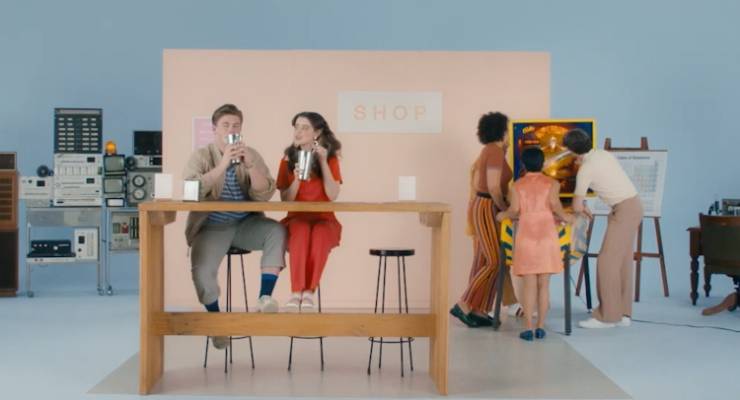
A new government video designed to teach consent to Year 10-12 students is as damaging as it is bizarre. With a focus on the perpetrator’s feelings and “maintaining” an unhealthy relationship, the video echoes the arguments of men’s rights activists and fundamentalist Christians.
The Good Society is a new resource for “teaching respectful relationships in schools” as part of the Australian government’s Respect Matters program, featuring content for primary, middle and senior school-aged kids.
One video, titled “Moving the Line”, designed to teach Year 10-12 students about consent, stands out as being particularly strange. Overtly sexual without ever using sexual references, the video features a young teen named Veronica apologising for smearing milkshake cream all over her boyfriend Bailey’s face.
The decision to make a female the perpetrator of sexual violence is also a strange one: men’s rights activists often argue sexual violence is gender-neutral though 97% of sexual violence is perpetrated by men.
Instead of discussing consent in terms of bodily autonomy — which I’m sure teens on the cusp of paying taxes and reaching adulthood would be able to grasp — the video uses drinking milkshakes, eating pizza and “touching your butt” as examples of encounters that require consent.
More worrying still, the video has a perverse focus on maintaining relationships even when Bailey finds it disrespectful.
(The Morrison government has, against all expert advice, previously advocated victims of domestic violence sit down and talk out their issues in the presence of a couples counsellor with no training in family violence. $10 million was set aside for couples counselling. Of the groups invited to participate, a large proportion are faith-based.)
This ultimately downplays the victim’s experience and can put power back in the hands of the abuser, creating an illusion of shared responsibility for the violence.
“In a respectful relationship, if someone moves the line, you might be upset but ultimately want to repair the situation,” the narrator in the video says.
“If a relationship is fundamentally disrespectful, you have even more difficult choices. Should you still try to repair the relationship, get help, or just walk away?”
Bailey starts writing a list of pros and cons about staying with Veronica. Pros for staying with her include include “kissing, pretty, and wavy hair”. Lord forbid a woman may have any actual personality traits.
“You may feel unsafe and need to protect yourself,” the narrator continues, offering zero victim-focused helplines or support networks.
Veronica quickly offers up her own defence, construing herself as the victim: “Please know I don’t want to be this way.” It’s a hair’s breadth away from saying “see what you made me do” and downplays the perpetrator’s responsibility for their actions. Another men’s rights argument that the victims should take responsibility for preventing sexual violence.
Instead of offering Bailey, the victim, support, Veronica gets given a business card for 1800 RESPECT.
“And remember, you can always find someone to support you, no matter which side of the line you’re on,” the narrator finishes.
The initiative is funded by the Department of Education, Skills and Employment. It’s not clear which expert and advocacy organisations — if any — were consulted prior to developing the modules.
If you or someone you know is impacted by sexual assault or violence, call 1800RESPECT on 1800 737 732 or visit 1800RESPECT.org.au.








An example of what can happen, if you give whacky religious types too much leeway in schools.
https://youtu.be/Q6Hhs22UpfY
What a shock! The government screwed up an educational program. How could this happen as there’s clearly no influence of any interest groups of this content?
As a teacher, colour me shocked!
I think what frustrates me is this destined to be yet another resource the government will have spent millions on that goes unused by schools because it’s crap.
Instead, it will fall on overworked teachers to craft their own actually functional resources.
It’s rewarding the perverted pseudochristian fanatics at the expense of public education and kids’ development. Did we vote to become a theocracy?
Unbelievable! This crap is what passes for information?
Our taxes at work again.
I don’t think that in over 60 years involved in politics I have seen anything so misleading and pathetic
A sad commentary on the state of politics in Australia.
That is truly bizarre. And Morrison sends his kids to a private religious school so they don’t get infected with ‘secular’ values. FFS.
That’s the whole point, LLoydois. Scotty “checked with Jen” and the loony-tunes video is precisely targeted at the shell-like pink ears of Lily and Abbey.
After all, we don’t want our young handmaids thinking any impure thoughts, as they thumb through their christian bibles and gussy up their glory boxes.